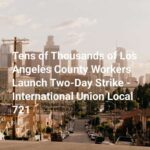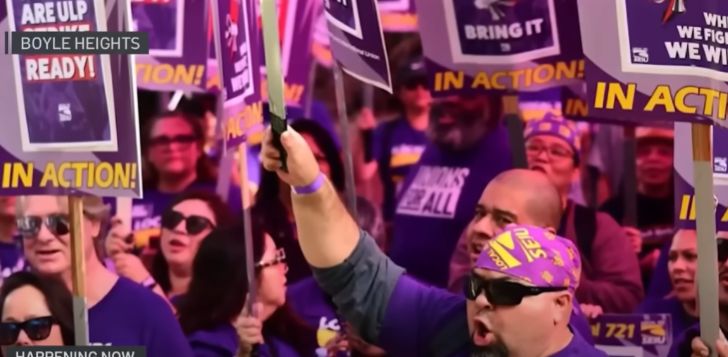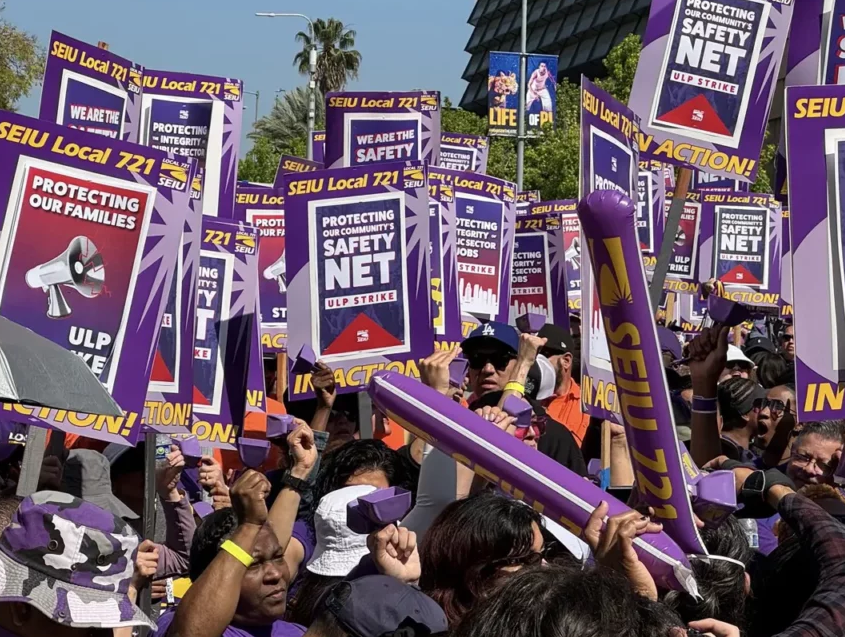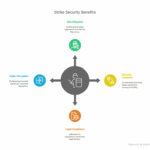
On the evening of Monday, April 28, 2025, more than 50,000 employees of Los Angeles County walked off the job, kicking off a two-day unfair labor practice strike that halted many core public services across the nation’s most populous county. Represented by Service Employees International Union Local 721, these workers—from public health professionals and social workers to library staff, custodians, clerks, and parks and recreation employees—vowed to remain on the picket lines until 7 p.m. Wednesday, demanding respect, fair wages, and an end to alleged labor law violations. This unprecedented action marks the first time in the union’s history that its entire membership has simultaneously staged a work stoppage, underscoring deep frustration among frontline public servants who have kept Los Angeles County running through wildfires, pandemics, and social-service emergencies.
Historical and Union Context
SEIU Local 721: A Legacy of Advocacy
SEIU Local 721 was founded in 1934 and has grown to represent over 55,000 county workers in Los Angeles. Its members include:
- Public Health and Mental Health Practitioners
- Social Service Caseworkers
- Library and Recreational Staff
- Custodians and Maintenance Crews
- Clerical and Administrative Personnel
Over the decades, Local 721 has negotiated multiple contracts securing cost-of-living adjustments, healthcare benefits, and workplace protections. Yet as inflation has surged and living costs in Southern California have climbed to record highs, union leaders argue that recent contract proposals have failed to keep pace with real-world expenses.
Breakdown of Negotiations
The previous collective bargaining agreement expired in March 2025. In the months that followed, union leadership and county negotiators held numerous bargaining sessions. Key sticking points emerged around:
- Wage Increases: The union sought multi-year increases to match inflation.
- Step-Scale Progression: Adjustments to ensure equitable pay across job classes and years of service.
- Outsourcing Protections: Restrictions on contracting out existing work to private vendors.
- Anti-Retaliation Safeguards: Stronger protections against surveillance and disciplinary actions for union activities.
Despite repeated proposals and counterproposals, both sides remained far apart. On April 18, Local 721 delivered notice of its intent to strike, triggering a 10-day countdown that culminated in Monday’s work stoppage.
Catalysts for the Strike
Eroding Real Wages and Rising Living Costs
Los Angeles County ranks among the nation’s most expensive regions. Between 2020 and 2025:
- Housing Costs rose over 30%, straining workers on fixed or modest wages.
- Transportation Expenses increased as fuel prices climbed and public transit fees rose.
- Groceries and Utilities also saw double-digit inflation, further squeezing household budgets.
For many county employees, stagnant base wages meant paycheck-to-paycheck living. Union negotiators argued that proposed raises—averaging 2–3% per year—would not offset annual inflation rates approaching 5%.
Alleged Unfair Labor Practices
During contract talks, Local 721 filed 44 unfair labor practice (ULP) charges, claiming the county engaged in:
- Surveillance of Union Communications: Monitoring emails and meetings of pro-union staff.
- Retaliatory Discipline: Issuing warnings or performance write-ups to active union members.
- Unauthorized Outsourcing: Awarding contracts for roles historically held by union members.
- Bad-Faith Bargaining: Deliberately slow walking counteroffers on key economic issues.
These allegations amplified union resolve, leading to overwhelming member support—98% voted in favor of authorizing a strike.
Scope and Logistics of the Walkout
Strike Timeline and Coordination
- April 18, 2025: Official 10-day strike notice delivered.
- April 28, 2025, 7:00 p.m.: First shift workers begin strike at shift’s end.
- April 29–30, 2025: Picket lines, community rallies, and solidarity events across county facilities.
- April 30, 2025, 7:00 p.m.: Strike concludes, pending progress in resumed negotiations.
Local 721 mobilized thousands of volunteers to staff picket lines in rotating shifts, ensuring continuous visibility at major county sites while minimizing strain on individual workers.
Major Picket Locations
- Los Angeles General Medical Center: Hundreds of healthcare employees wielded homemade signs reading “Safety Net Workers Unite.”
- Hall of Administration (Downtown L.A.): Clerical and administrative staff formed a human chain, blocking public service counters.
- County Library Branches: Librarians and aides picketed outside 80+ branches, handing out leaflets to patrons.
- Public Parks and Recreation Facilities: Recreation leaders and custodians staged “play-ground pickets,” drawing families into discussions about fair wages.
These coordinated actions underscored the breadth of county operations affected and the union’s organizational strength.
Impact on Public Services
Healthcare and Mental Health Clinics
- Reduced Clinic Hours: Several non-emergency public health clinics limited hours or remained closed, delaying routine checkups and vaccinations.
- Emergency Coverage Only: Some mental health crisis lines remained operational, but ongoing counseling appointments were rescheduled.
- Community Outreach Halted: Mobile health vans serving underserved neighborhoods paused operations, affecting immunization drives and health screenings.
Social Services and Benefits Processing
- Caseworker Shortages: Family support workers, disability services staff, and elder care coordinators were largely absent, creating backlogs in applications and renewals for CalWORKs, Medi-Cal, and In-Home Supportive Services.
- Increased Wait Times: Customers experienced extended hold times on benefit hotlines and slower in-person service at social service offices.
Libraries, Parks, and Recreation
- Library Branch Closures: Over 80 county library branches shuttered doors, canceling after-school programs, ESL classes, and public computer access.
- Rec Center Shutdowns: Community centers, pools, and youth sports programs were suspended for the strike duration.
- Beach and Park Amenities Unavailable: Public restrooms, picnic areas, and park maintenance crews were inactive, leading to temporary loss of recreational space.
Administrative Operations
- Permit and Licensing Delays: Issuance of permits—building, marriage, business—slowed significantly.
- Clerk and Document Services: Filings for vital records, marriage licenses, and civil documents saw hour-long waits or were postponed.
- Medical Examiner’s Office: Routine coroner reports were delayed as support staff honored picket shifts.
The cumulative effect was widespread inconvenience for residents and businesses, highlighting the county’s reliance on unionized labor for everyday services.
County’s Fiscal Challenges
Unprecedented Budgetary Pressures
Los Angeles County faces a perfect storm of financial strain:
- Childhood Sexual Assault Settlements: A looming $4 billion settlement covering historical abuse claims.
- Wildfire Recovery Costs: Follow-up expenses from January’s devastating wildfires, estimated at $2 billion.
- Federal Funding Uncertainty: Potential cuts to Medicaid and public health grants amounting to hundreds of millions annually.
With these liabilities, county executives warn that meeting union demands without new revenue could force layoffs or service cuts elsewhere.
Balancing Compensation and Sustainability
County spokespersons emphasize the need for fiscal prudence:
- Avoiding Structural Deficits: Ensuring recurring expenses do not exceed annual revenues.
- Protecting Essential Services: Preserving core public safety and health programs.
- Phased Wage Adjustments: Proposing targeted raises in low-income job classifications first.
Yet union leaders counter that delayed action and insufficient proposals only deepen worker hardship and erode morale.
Voices from the Picket Line
Union Leadership Statements
- David Green, SEIU Local 721 President:
“We are the backbone of Los Angeles County—through emergencies, fires, and health crises. Our fight is for dignity and respect.” - Lillian Cabral, Veteran Bargaining Committee Member:
“I’ve been here since 1978. I’ve never seen a process so slow, so unfair to those who’ve given decades of service.”
Stories from Frontline Workers
- Public Health Nurse: Juggling a mortgage and student loans, she described skipping meals on weekends just to make ends meet.
- Library Assistant: Shared concern over losing affordable housing after 15 years in county employment, despite promotions and commendations.
- Custodian: Emphasized that without a living-wage increase, many families would have to choose between rent and basic necessities.
These personal accounts humanize the strike, reinforcing the stakes for the county workforce.
Community and Business Reactions
Public Sentiment
- Solidarity Supporters: Neighborhood groups delivered snacks and water to picket lines, chanting in solidarity with demands for fairness.
- Service-Dependent Residents: Frustration surfaced among seniors and low-income families relying on uninterrupted library access and social services.
- Local Businesses: Cafés near picket sites saw mixed effects—some welcomed extra foot traffic from strikers, others faced customer drop-offs due to blocked entrances.
Political Leaders and Advocates
- City Council Members: Expressed calls for expedited mediation but warned against overtly taking sides to avoid politicizing public services.
- Labor Rights Activists: Cited the strike as emblematic of a national resurgence in worker activism, urging other public-sector unions to stand firm.
Broader Labor Movement and Regional Implications
A National Resurgence in Union Activity
Across 2025, the U.S. has witnessed a wave of union assertions:
- Entertainment Strikes: Writers and actors paused production on major studios.
- Transit Worker Actions: Regional transit authorities faced work stoppages over safety and pay.
- Manufacturing Slowdowns: Auto parts plants and factories engaged in solidarity walkouts.
Analysts view the LA County strike as part of a larger awakening among workers demanding greater economic justice and workplace dignity.
Legislative Ripples in California
In Sacramento, bills advancing through the state legislature aim to:
- Strengthen Collective Bargaining Laws: Requiring transparent good-faith negotiation standards for public employers.
- Penalize Unfair Labor Practices: Levelling fines and mandatory remedies for employer violations.
The outcome of this high-profile county dispute may influence the passage and design of such labor reforms.
Legal Framework: Unfair Labor Practices
California Public Employment Relations Board (PERB)
Under PERB regulations, public employees have the right to:
- Organize and Bargain Collectively without interference.
- Engage in Concerted Activities for mutual aid or protection.
- Refrain from Union Activity if they choose.
Local 721’s 44 ULP charges span allegations from retaliatory discipline to contracting out, setting the stage for potential PERB hearings if the county and union cannot reach a mediated agreement.
Potential Remedies and Timelines
- Mediation Orders: PERB could appoint a mediator to facilitate new bargaining sessions.
- Cease-and-Desist Requirements: The county might be compelled to halt unlawful practices immediately.
- Monetary Remedies: In some cases, back-pay and restitution for affected workers.
- Timeline: PERB cases can span six months to over a year, making a negotiated settlement far more expedient for both parties.
Negotiation Dynamics and Path to Resolution
Union’s Core Demands
- Inflation-Adjusted Wage Increases: Multi-year plan tied to regional CPI.
- Enhanced Step-Scale Protections: Automatic progression and equity across classifications.
- Anti-Retaliation Clauses: Clear prohibitions on surveillance and punitive discipline.
- Guaranteed Work Preservation: Limits on outsourcing and subcontracting.
County’s Proposals
- Phased Wage Adjustments: Focused first on lowest-paid classifications, with caveats based on annual budget health.
- Pilot Workforce Development Programs: Upskilling initiatives in mental health and social services.
- Review Committees: Joint labor-management panels to oversee outsourcing decisions.
Mediation and Third-Party Facilitation
State labor officials have offered to convene mediation sessions. Neutral facilitation could help restart stalled conversations by:
- Clarifying Misunderstandings: Ensuring both sides hear each other’s core concerns.
- Exploring Creative Compromises: Such as revenue-tied bonus structures or flexible work-from-home arrangements.
- Setting Realistic Timelines: For incremental progress and future contract talks.
Long-Term Implications
Service Delivery and Public Confidence
A swift, equitable resolution could restore community trust in county governance and demonstrate the efficacy of collective bargaining. Conversely, prolonged disputes risk eroding public confidence and highlighting systemic reliance on union labor.
Precedent for Other Public Sector Unions
If SEIU Local 721 secures substantial gains, other municipal and school district unions may feel emboldened to pursue similar demands, potentially triggering a domino effect of labor actions throughout California.
Fiscal Sustainability for Los Angeles County
Meeting union terms without new revenue sources could widen structural deficits. The county may need to consider:
- Ballot Measures: Targeted tax initiatives to fund public employee compensation.
- Reallocation of Federal Grants: Securing additional federal support for health and public safety programs.
- Public-Private Partnerships: Innovative models to share costs while maintaining public oversight.
Lessons Learned and Recommendations
- Proactive Bargaining: Early, continuous engagement with labor representatives can prevent impasses.
- Transparent Financial Modeling: Sharing budget forecasts with unions builds trust and mutual understanding.
- Community Outreach: Keeping residents informed on negotiation progress reduces frustration during service disruptions.
- Third-Party Facilitation: Neutral mediators can break logjams and propose novel solutions.
- Contingency Planning: Advance planning for essential services during labor disputes minimizes public impact.
The two-day strike by SEIU Local 721 members in Los Angeles County represents a watershed moment for public-sector labor relations. As more than 50,000 frontline workers stand up for fair wages, workplace respect, and protection from unfair practices, the stakes extend far beyond a single contract. The outcome will influence the financial health of the county, the reliability of public services, and the broader trajectory of union power in California and beyond. Balancing worker dignity with fiscal responsibility remains a delicate art—one that demands creativity, transparency, and a genuine commitment to collaboration on both sides.










